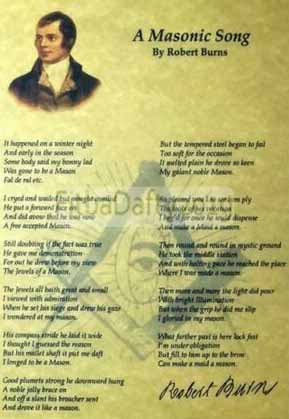A masonic song
une chanson maçonnico-paillarde de Robert Burns
![]()
Nous avons trouvé cette très égrillarde chanson dans l'ensemble de celles attribuées à Robert Burns sur le site Masonic poets Society.
|
A Masonic Song It happened on a winter night, I cryed and wailed, but nought availed, Still doubting if the fact was true, The Jewels all, baith great and small, So pleased was I to see him ply Then round and round in mystic ground His compass stride he laid it wide, Good plummets strong he downward hung Then more and more the light did pour But the tempered steel began to fail, What farther passed is here locked fast, |
Une chanson maçonnique Cela se passa une nuit
d’hiver J’ai crié et pleuré mais rien n’y
fit Comme je doutais que ce fût
vrai Tous les bijoux, grands et
petits Si heureuse je fus de le voir
utiliser Alors sur un sol mystique il fit des
tours Il allait à grandes enjambées Il pendit une belle et forte
perpendiculaire Alors de plus en plus la lumière se déversa Mais l’acier trempé se mit à
faiblir Ce qui se passa ensuite |
Dans son ouvrage British Poets and Secret Societies (Routledge Revivals), Marie Mulvey-Roberts présente et commente cette chanson comme suit (pp. 68-70) :
The connection between wine, women and Masonry during the eighteenth century is evident from a number of bawdy Masonic drinking songs. Invariably the Masons' working tools were subject to sexual innuendo while aspects of ritual and symbolism were used to evoke erotic imagery. Perhaps saucy lyrics were intended to compensate for the exclusion of women from the lodge-room. But it is more likely that the brotherhood hoped to counter their enemies' accusations of sodomy by asserting their heterosexual virility. A bawdy poem attributed to Burns called "A Masonic Song", describes how a Mason provides evidence of his initiation through his sexual prowess ...
Throughout this poem Masonic terms are used as sexual metaphors. These include jewels which denote rank and office and the broacher or broached thurnel which is a conical stone chisel. Burns also exploits the phallic symbolism of the plummet or plumb-line, the 'gage' referring to the 24-inch gauge used by the Entered Apprentice and the shaft of the "mallet" or hammer associated with the Master of the lodge. The Masons' clandestine communication through the use of body language is parodied by the image of the "compass stride" in stanza five while the secret "grip" or handshake is ridiculed in stanza ten. The poem culminates in a description of the sexual act which caricatures Masonic initiation by punning on the expression "made a Mason". G. Legman dismisses the homosexual undertones of the poem as factitious "homoerotic mummery" which may have been intended to clash with its feminine perspective for comic effect.
Apparently Burns composed the "Masonic Song" extempore at a lodge meeting. The Masonic environment provided Burns with poetic inspiration because it was able to accommodate his defiance of the social and moral order outside.

![]()
(*) Fal de ral est une formule d'usage courant dans la vieille chanson anglaise, par exemple ici ou ici ... ou même dans les Irish songs de Beethoven :
| 20 IRISH SONGS, WoO153
NO.3 THE BRITISH LIGHT DRAGOONS ‘Twas a Marechal of France, and he fain would honour gain, Walter Scott |
![]()
Other english-speaking songs